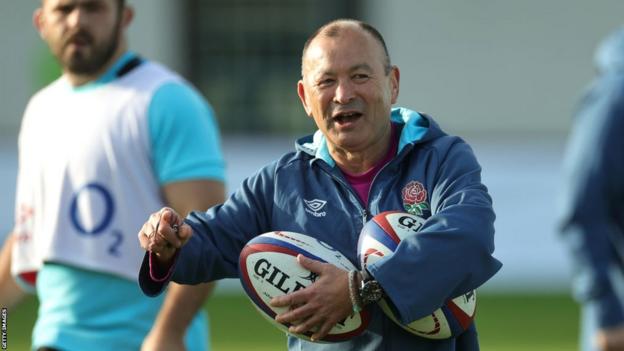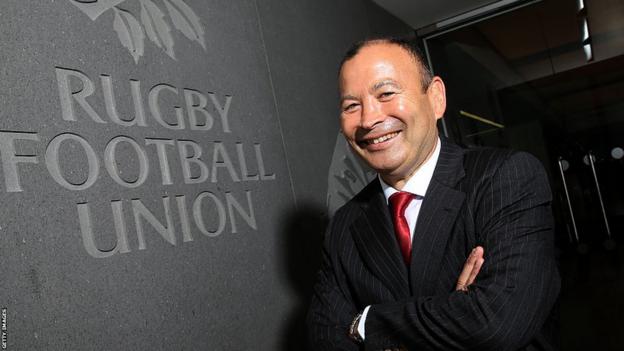
It ended a bit like it began, with Eddie Jones rushed out of Twickenham with the same haste he was brought in.
It was never the Rugby Football Union's long-term plan to appoint Jones in 2015 - Stuart Lancaster had five years left on his contract - and it was never the plan to sack him now, just nine months before a Rugby World Cup for which he was so assiduously preparing.
Analysing the Jones era is hard. He splits a room, and the England fans, like no other coach before him.
Is he England's best ever, who presided over a record-equalling winning run and the greatest performance in English rugby history? Or did he inherit a strong squad from Lancaster, fall short when it mattered most, then struggle to kick on from 2019?
Similarly, there is a lingering feeling the era has ended a year too soon, and he should have got the chance to shoot for the stars in France, at a tournament he knows better than anyone else. On the other hand, given the turbulent nature of the past seven years, it also feels like a minor miracle it lasted this long.
It all started so well, with Jones shaking up the England squad with his unique blend of humour, conviction, and defiance. A first Grand Slam in 13 years, a 17-match winning streak, and a rugby nation back dining at the game's top table; Jones fulfilling his brief, and much more.
Minor cracks were evident in 2017, as England were beaten in Dublin and Jones' fondness for conflict became more and more apparent. His tenure threatened to unravel a year later but come 2019, Jones had a squad fit and firing, with a statement victory at the start of the Six Nations - again in Dublin - showing what he and the team were capable of in World Cup year.
England arrived in Japan in good nick - a comfortable win over 14-man Argentina and the cancellation of the France game leaving them in top shape for the knockout stages. Two superb wins followed, Australia comfortably dispatched - a theme of the Jones era - before the flagship win against double reigning champions New Zealand.
Ever the planner, Jones had prepped England for this game for years, and he produced a coaching masterclass to dethrone the All Blacks. However, the perfect planning and preparation for the semi-final is juxtaposed with England's erratic display in the final; again, a curious contrast, like so much during Jones' tenure.
In hindsight, that was the moment for Jones and the RFU to shake hands and part ways, with England back as a feared force in the rugby world and Jones' legacy as one of the great coaches secured.
It was never the plan for him to go past 2019. In his first news conference, in November 2015, both Jones and RFU chief executive Ian Ritchie stressed this was a four-year project, by the end of which Jones would be in the Caribbean watching cricket and an assistant coach would be primed to take over.
But as chief executives came and went, so did any succession plan. Steve Brown signed Jones on for another two years - again, with a brief to groom a replacement, before Bill Sweeney abandoned that and signed Jones up until 2023.
The years since 2019 were not entirely fruitless - England scooped a Triple Crown and Six Nations title in 2020, as well as an Autumn Nations Cup, albeit nabbed in extra time after struggling against a much-changed France.
But Jones' obsession with the World Cup seemed to take over, and the more he focused on the holy grail in France next year, the more the team seemed to lack a shape and identity amid the promises of jam tomorrow.

After two poor Six Nations and constant talk of development and transition, the beating at the hands of South Africa and the boos of the Twickenham faithful were the last straw for the RFU hierarchy, although you could forgive Jones for feeling perturbed as to why the project the two parties had made together was abandoned so suddenly.
Frustrating and captivating in equal measure, Jones will be missed.
His public pronouncements - a scattergun of insights, wise-cracks, barbs and deflections - rarely failed in elevating the sport into the limelight, for reasons good and bad. Interviewing him was simultaneously a pleasure and challenge, with his thirst for conflict - whether with journalists, the opposition, or even English rugby as a whole - both getting him into trouble and helping to take the pressure off his team.
As a selector, he succeeded in bringing through some new players - although many more came and went - yet he also relied on the bulk of Lancaster's squad, and spent the last couple of years agonising whether to move on from them.
The clarity and conviction - such a hallmark of the early years - seemed to seep away, perhaps inevitable after seven years in one role; something Jones himself had warned against.
As with the supporters, some players will be relieved Jones has gone, given his heavy-handed management style. Others will be sad, and wonder if any chance of glory in France next year has left with him.
Similarly, while some of Jones' assistant coaches and staff members speak fondly of his influence, many have struggled to make their mark over the years, finding themselves bit-part players in the Eddie Jones show, yet still pushed extremely hard by the man in charge.
His most recent crop of coaches is a curious blend, plucked from all corners of the world, as Jones continued the take-it-or-leave-it attitude towards the Premiership which was consistent through his reign.
Jones never did groom his successor as the RFU had once hoped - again, this was perhaps a fanciful ambition given his domineering personality.
Yet his likely successor, Steve Borthwick, owes so much of his coaching pedigree to Jones - working with him at Japan and England. If Borthwick is to be a success, English rugby will have Jones to thank.
When Jones was appointed, a number of former acquaintances commented that his tenure would either be an extraordinary success or an unmitigated disaster. The Six Nations titles and the World Cup final would ensure it was certainly not the latter, but just one Grand Slam in seven attempts and a disjointed final two years would ensure it isn't quite the former either.
Jones continues to split opinion right until the end.


Source: BBC Rugby Union News
